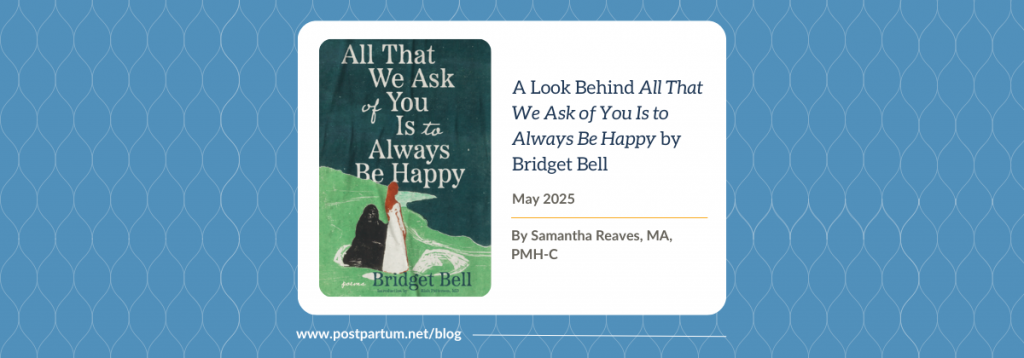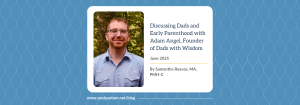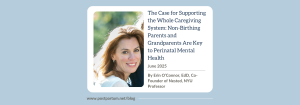By Samantha Reaves, MA, PMH-C | Postpartum Support International
Trigger warning: intrusive thoughts about baby

“I wish I’d had this book when my child was born. Everything would’ve been more bearable.”
-Eugenia Leigh, author of Bianca
“Bell sings a song about motherhood, that extraordinary event of body and mind, and about her traumatic survival from PPD, an experience more common than acknowledged and seldom written about so vividly.”
-Connie Voisine, author of The Bower
Q: Thank you for sharing your beautiful poetry with the world. Tell us about yourself and your debut collection.
A: Thank you for inviting me to talk about the collection! I’m a poet, a divorced single mother of two elementary-aged kids, and I teach English at Durham Technical Community College in Durham, NC. I also bartend at a local brewery and proofread for a literary press.
I had postpartum depression that came on quickly and ruthlessly after the birth of my eldest. I started writing the collection about a month after she was born and worked on it for the next six years or so. In addition to exploring PMADs [Perinatal Mood and Anxiety Disorders], it also contains a long poem about a miscarriage I had between my daughter and son, and examines the decision to have another baby after having experienced postpartum depression.
The book is part of a series published by CavanKerry Press called LaurelBooks that explores the experience of living with illness, whether that be physical or mental. Dr. Riah Patterson, who is the Medical Director of the Perinatal Psychiatry Inpatient Unit at the University of North Carolina, Chapel Hill, wrote an amazing forward for my collection that helps to put the poems into a medical context. I also did a lot of research about perinatal mood and anxiety disorders and incorporated that research into the collection, both in the poems and as epigraphs to poems or sections. It was really important to me that the poems be couched in science because PMADs are medical issues that can be treated.
Q: Will you tell us about your experience with postpartum depression?
A: It’s difficult to know when my symptoms started because I was so sleep-deprived and also on strong painkillers because I had a c-section. I had a “normal” Edinburgh Postnatal Depression score when I was screened before leaving the hospital. The first morning I woke up in my house with the new baby, however, I knew something was wrong. It was like a state of shock. I felt trapped and panicked and started having intrusive thoughts about how I could disappear–I talk about that in one of the poems: “Welcome to the land of fantasy. I dream / I leave with the stars, follow their amber-iris eyes, / sneak out with a tiptoe creep / then pedal to the metal in my old CRV.”
I also experienced a profound sense of sadness that I couldn’t shake. I think women in particular are very good at masking, so no one around me knew how chaotic I felt mentally and emotionally. I talk about that, too–I refer to how some mothers go through all of this turmoil while “flashing the bright, red smile of a façade.” So I was ruminating and crying and masking and I was also terrified to be alone with the baby. I thought I would never be “normal” again, that I wouldn’t be able to go back to work and that I’d never be the woman I was before I had my baby.
Fortunately, I have access to good medical care in my community, and while initially, my symptoms were dismissed by an OB/GYN at my practice because “I didn’t have a history of mental illness,” I was able to get help relatively quickly and through a combination of medication, therapy, and support groups, I recovered.
Q: How has writing and sharing these poems affected your healing from postpartum depression?
A: Writing the poems was a huge part of my healing process. Working on the really personal, autobiographical poems enabled me to process a lot of my shame and guilt. Researching for the book helped me better understand some of the causes of PMADs and how truly common they are.
My daughter is almost 11, so I’m a ways out from my experience, but sharing the poems publicly now that the book is out has been so incredibly rewarding. I’ve had so many parents–both moms and dads–come up to me after readings to tell me they experienced something similar. Being able to help people feel seen is so important to me.
A: There is definitely a lot of rage simmering below the surface of many of the poems. The title itself, All That We Ask of You Is to Always Be Happy, is really rooted in rage. I use sarcasm a lot to get at the rage. Some of the poems express rage at the medical establishment for dismissive attitudes towards women. Some of the poems express rage at the narrative of motherhood, how we are told to “love every moment.”
There is also rage at how the United States takes care of new mothers–one poem calls out the lack of “paid maternity leave”; another poem calls out lack of support for nursing mothers, how so many women have to “strip down in offices, / plug into machines, type / emails as our nipples / stretch like rubber bands,” because time and space are not made for nursing mothers. Many of the speakers in these poems are ticked off and justifiably so.
Q: So much of what you’ve achieved with this collection – bringing visibility and compassion to those suffering from a perinatal mental health disorder – is what PSI strives to do every day. What do you hope readers will take away from reading your poems?
A: Truly, my greatest goal with this collection is that it will help other women. My healing process was tremendously aided by hearing the stories of other women; there’s a line in one of the poems where I talk about how I “searched for other mothers’ stories and folded up / in relief when I read about a woman who pictured her baby / floating dead in a swimming pool.”
To know I was not the only one experiencing intrusive thoughts or crushing guilt or regret made me realize I was not a bad person. I was sick and I needed help. I hope these poems can be a small part of that help people need.
All That We Ask of You Is to Always Be Happy was published in February 2025 and is available now.
Perinatal Mental Health: Signs, Symptoms, and Treatment
Postpartum Planning Class
Get Help










